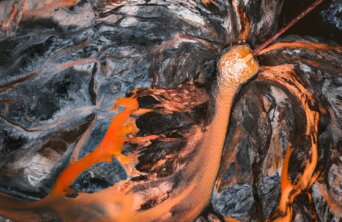- About
- Topics
- Picks
- Audio
- Story
- In-Depth
- Opinion
- News
- Donate
-
Signup for our newsletterOur Editors' Best Picks.Send
Read, Debate: Engage.

| topic: | Pollution |
|---|---|
| located: | Thailand |
| editor: | Jitsiree Thongnoi |
First it was the stench, then the changing colour of the ponds that made residents of eastern Thailand's Nong Phawa community realise that something had gone seriously wrong in their neighbourhoods.
Since at least 2012, the Nong Phawa community had observed the nearby recycling factory with suspicion. Its close proximity to the community centre and the noticeable odour it emitted raised serious concerns. But their understanding of the plant's activities was limited, preventing them from speaking out.
"In 2019, the wells at the factory broke, flooding the villagers’ land in the area around the plant. Contaminants in the flood water seeped through the villagers’ reservoirs, changing the water’s colour, turning it into acid and killing the fish in the villagers’ farms," said Dawan Chantarahesdee, a community advisor at Ecological Alert and Recovery - Thailand (Earth), an NGO that has been working with local residents since the beginning of the episode.
In 2021, more than a dozen residents of Nong Phawa took on the role of plaintiffs in a legal battle against Win Process Co, a hazardous waste recycling company located in Thailand's Rayong province. They sought compensation for the loss of over a thousand rubber trees, which constitute their primary income source, and for the contamination of local water sources with heavy metals and Volatile Organic Compounds (VOCs).
In a clear victory, the Rayong provincial court ordered in December 2022 Win Process Co to clean up the toxic waste contamination resulting from its operations, after consistent types of pollutants were found inside the factory and outside. It also ordered the company to pay 20.82-million-baht (about 562 140 EUR) in compensation to villagers who had been forced to suffer the effects of the contamination for a decade.
Although the case stands as an example of environmental justice, it hasn't led to a rapid resolution of the villagers' troubles. Even after months following the trial's conclusion, the hazardous waste and substances have not been cleared from the plant, and the harm inflicted upon the natural water resources endures. Chantarahesdee noted that, apart from pending compensation for the villagers, the situation remains unchanged.
But the Nong Phawa case is hardly an exception in Thailand, where inadequate oversight, legislation and hazardous waste management technology are hindering the establishment of a clean recycling process.
In 2020, residents of a village in tambon Nam Phu of Ratchaburi's Muang district won a court battle against Wax Garbage Recycle Centre Co after the latter was found to have polluted the local environment, which negatively impacted residents' health.
According to Chantarahesdee, the primary culprit behind the situation was official negligence, spanning from the factory's initial operation to the period after the court case.
"Win Process started operating even when related factory permits were not obtained," explained Chantarahesdee. “Villagers protested against the plant obtaining more permits but failed to do so."
"Now after the court case, prohibited substances remain at the plant and no one can explain how they came to be there in the first place."
Minimal efforts were made after the court ruling last December. In fact, this was not the first court case against Win Process. In March 2021, the Rayong provincial court declared Win Process to be unlawfully holding toxic substances and mandated the factory to eliminate them within a two-year timeframe.
The court verdict specified various substances, including 4,000 tonnes of iron dust and slag, 800 tonnes of liquid and sludge stored in concrete pits, unidentified liquid chemical waste in containers, as well as a collection of 1,000-liter contaminated containers, and 14,000 tonnes of the polluted water in wells and the surrounding area. Today, these pollutants remain in their original locations.
"In terms of compensation money, the lawyer for the villagers in the case still has to investigate the assets held by the plant and their operators," said Chantarahesdee.
"There is no telling when restoring farmlands, water reservoirs and soil, and compensating villagers will be completed. And this affects the villagers’ morale."
Chantarahesdee added that Win Process has engaged a chemical and ground clearance company to undertake the task of eliminating hazardous chemical substances and reinstating the natural environment and water resources of Nong Phawa.
"But rubber trees are dead, the orchards are gone and all the fish in the Nong Phawa natural stream are dead," she concluded. "The lands are dead and cannot be passed on to the next generation to make a living off them."
Image by Ivan Bandura.